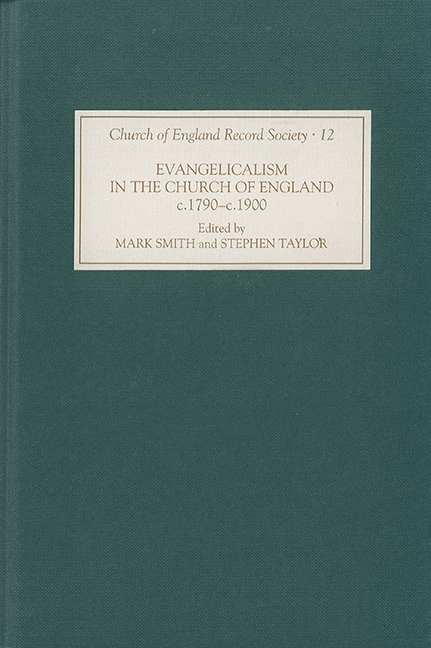Book contents
- Frontmatter
- Dedication
- Contents
- Preface
- Introduction
- 1 Hannah more and the Blagdon controversy 1799-1802
- 2 Henry Ryder: A charge delivered to the clergy of the diocese of Gloucester in the year 1816
- 3 The Undergraduate Diary of Francis Chavasse 1865-1868
- 4 J. C. Ryle: ‘First words’. An opening address delivered at the first Liverpool diocesan conference, 1881
- Index
- Miscellaneous Endmatter
4 - J. C. Ryle: ‘First words’. An opening address delivered at the first Liverpool diocesan conference, 1881
Published online by Cambridge University Press: 31 August 2018
- Frontmatter
- Dedication
- Contents
- Preface
- Introduction
- 1 Hannah more and the Blagdon controversy 1799-1802
- 2 Henry Ryder: A charge delivered to the clergy of the diocese of Gloucester in the year 1816
- 3 The Undergraduate Diary of Francis Chavasse 1865-1868
- 4 J. C. Ryle: ‘First words’. An opening address delivered at the first Liverpool diocesan conference, 1881
- Index
- Miscellaneous Endmatter
Summary
Few Victorian bishops and fewer leading Victorian evangelicals are household names among twenty-first century christians, but J. C. Ryle (1816-1900), from 1880 first anglican bishop of Liverpool and a prominent evangelical for much of the second half of the nineteenth century, is an exception in both categories. Several of his expository and devotional writings are still in print and he enjoys an enduring reputation as an articulate exponent and defender of a traditional evangelical interpretation of the gospel. Twentieth-century conservative evangelicals, especially those in the Reformed tradition like Martyn Lloyd-Jones and J. I. Packer, held Ryle in high esteem as an advocate of the old paths’ at a time when biblical criticism and increasing pluralism in theology seemed to be changing the face of English evangelicalism, when anglo-catholicism was becoming the dominant school in the Church of England, and when all denominations were struggling to engage effectively in mission to urban society. In Packer's opinion, Ryle was ‘one of the greatest of Victorian evangelicals’, not least because ‘in an age of giddy religious Athenianism no new idea had ever passed either his lips or his pen.’ This impression of Ryle as the icon of unbending traditionalism can be reinforced by an appeal to contemporary observers, including Ryle's son Herbert, a leading Old Testament scholar, who ceased to serve as his father's examining chaplain in 1887 because their views on the acceptability of biblical criticism had diverged too widely. Herbert wrote from Liverpool, ‘I write in a land where antagonistic German criticism has not obtained much foothold, even in the bookshelves.’ It would seem that Ryle's nom de plume, ‘An Old Soldier’, familiar in the correspondence columns of the evangelical press, was well chosen.
This picture of Ryle needs to be qualified in two respects. First, the varied agenda of Ryle's admirers - and of his critics - both contemporary and more recent, must be recognized. To contemporaries within his own school of thought, Ryle was the standard-bearer of evangelical doctrine, ecclesiology and missionary strategy, whereas for liberal and high church controversialists he could serve as an Aunt Sally, the epitome of dogmatic, pugnacious and barren evangelicalism, particularly in the context of his involvement as bishop in the prosecution of James Bell Cox for the use of illegal ritual at St Margaret's, Princes Road.
- Type
- Chapter
- Information
- Evangelicalism in the Church of England c.1790–c.1890A Miscellany, pp. 283 - 326Publisher: Boydell & BrewerPrint publication year: 2004



